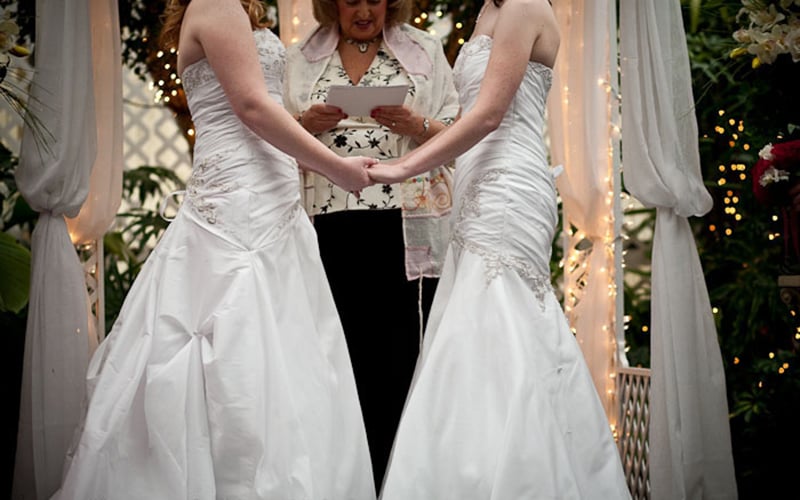- Slug: BC-CNS-Parental Rights,530
- File photo available (thumbnail, caption below)
By PHILIP ATHEY
Cronkite News
\WASHINGTON – The Supreme Court on Monday let stand an Arizona ruling that said paternity should be applied the same way in same-sex marriages as it is in opposite-sex marriages when it comes to determining parental rights.
The court’s refusal to hear the case means Suzan McLaughlin still has parental rights over the child that Kimberly McLaughlin conceived through artificial insemination while the two were married.
Lawyers for Kimberly did not immediately respond to a request for comment Monday, but an attorney for Suzan welcomed the ruling that he said will allow the dispute “to be treated like a family law case,” as it should.
Suzan and Kimberly were married in California in 2008 and shortly thereafter they began trying to get pregnant through artificial insemination with an anonymous sperm donor. Initially the couple planned for Suzan to get pregnant, but when those attempts were unsuccessful, they started trying with Kimberly.
In 2010, Kimberly became pregnant and the couple moved to Arizona, where they signed a co-parenting agreement that gave Suzan the same rights, responsibilities and obligations of a biological parent.
When their child was born in 2011, Suzan stayed home to take care of him, while Kimberly went back to work.
But the relationship went sour and shortly before the child’s second birthday, Kimberly took the child and moved out of the family home, cutting off all contact between him and Suzan while simultaneously petitioning for a divorce.
Under Arizona law, a man is presumed to be the father of a child if he and the mother “were married at any time in the ten months immediately preceding the birth.” But the law had never been applied to two women in the same situation.
The Arizona Supreme Court ruled last fall that the state’s method for determining paternity should apply to women who have children in same-sex marriages just as it does to a opposite-sex couple. It pointed to the U.S. Supreme Court’s 2015 ruling in Obergefell v. Hodges that legalized same-sex marriage nationwide and gave same-sex couples the same rights and responsibilities as traditional marriages.
Kimberly appealed, but the high court’s decision Monday to let the Arizona Supreme Court ruling stand “simply reaffirms what the court has already made clear,” said Douglas Hallward-Driemeier, one of Suzan’s attorneys.
“These rights have to be equal whether that’s same-sex or opposite-sex couples,” he said.
Legal advocates for LGBT rights agreed that the court’s ruling in Obergefell was clear on the rights it gave same-sex couples.
“It is another reaffirmation that the Supreme Court understands that marriage equality means marriage equality,” said Catheryn Oakley, senior state legislative director and legal counsel for the Human Rights Campaign.
Nancy Marcus, law and senior policy attorney for Lambda Legal said, courts “have been very clear … it’s not just the marriage itself but the rights in marriage that same-sex couples are entitled to.”
The McLaughlins’ case will now be sent to the Arizona family courts to make custody arguments.
“Family law is not pretty,” said Marcus. But she said that along with the right to marriage comes the right to divorce, because when a marriage falls apart, “that is when you need those protections the most.”
For more stories from Cronkite News, visit cronkitenews.azpbs.org.
^__=
Web links:
_ Arizona Supreme Court ruling: http://www.scotusblog.com/wp-content/uploads/2018/01/17-878-opinion-below.pdf
_ Arizona paternity law: https://www.azleg.gov/ars/25/00814.htm
_ Kimberly McLaughlin appeal: https://www.supremecourt.gov/DocketPDF/17/17-878/24277/20171218151547560_USSC%20Petition%20for%20Writ%20of%20Certiorari%20without%20Appendix.pdf
_ Suzan McLaughlin response: https://www.supremecourt.gov/DocketPDF/17/17-878/28268/20180118135641122_17-878%20BIO.pdf
^__=
Click on thumbnail for full-size image:
Arizona’s Supreme Court said the state’s paternity law has to apply to same-sex couples who have a child while married when determining parental rights if the couple later splits up. (Photo by Amy Teegan/Creative Commons)
